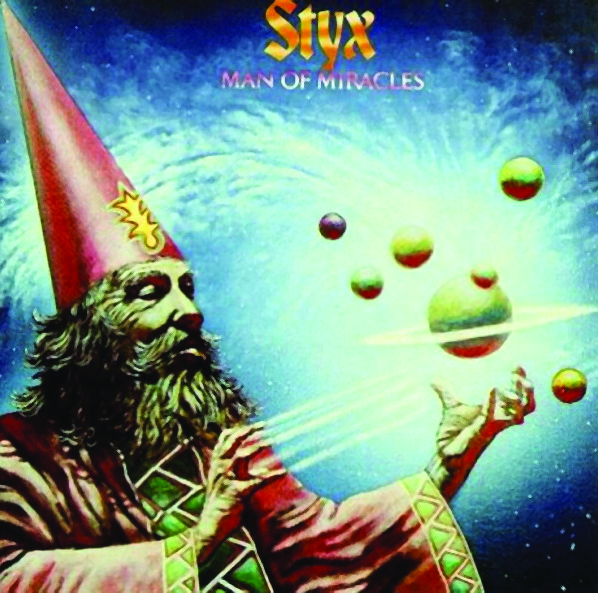Styx: "We’ve never moved totally away from our love of prog".
Dennis De Young and Tommy Shaw argue that despite the big hits, Styx always had a proggy heart

Styx? Oh yes, the men who gave us such limp-wristed hits as Babe, Lady and Boat On The River. Hardly a band who should be considered as having any prog worth, surely? Except the lengthy history of the Chicago band tells us otherwise, and that’s something founder member Dennis DeYoung is quick to justify.
“If you talk to a Gentle Giant fan, they’ll tell you that Styx are not a prog rock band in the strictest sense of the term, and they’d be right,” he says. “But a lot of our roots do come from the great British prog bands of the 70s, in particular Yes and ELP.
“I was probably more responsible than any other member of the band for bringing in the progressive influences. As a keyboard player I admired the way that Keith Emerson and Rick Wakeman made the instrument so important. I listened to them, and it gave me the inspiration to compete with show-off guitarists.”
The Styx connection to prog rock is certainly recognised by Ben Harris Hayes, singer, guitarist and keyboardist in Enochian Theory.
“I think they were very much part of the then-emerging prog scene, but brought that harder edge to their songs, unlike some of their contemporaries who preferred the more theatrical approach. Their earlier material was definitely more progressive than their later AOR style. There were little flourishes of supreme musicianship, backed up by solid songwriting. It’s no surprise they had a lot of success by melding those two things confidently.”

For guitarist Tommy Shaw, who joined Styx in 1975, there’s little question that the band have always pursued a distinctly progressive path.
“We’ve never moved totally away from our love of prog. Even when we had hit singles like Babe, you could listen to our albums and hear songs which were a lot more musically challenging. We used to love jamming out ideas and letting our imaginations take over, and that’s where some of our lengthier pieces were born.”
Sign up below to get the latest from Prog, plus exclusive special offers, direct to your inbox!
Certainly in their early days, the music of Styx was clearly rooted in the progressive era, as DeYoung notes.
“I grew up listening to The Beatles, and you could say that they were the first progressive band. But when we began, it was important that we didn’t just copy what The Beatles had done. Instead, we looked further afield and that’s where a love for what the great prog bands in the UK were doing took hold. They weren’t our only inspiration of course; we were certainly very diverse. But even that was something we got from the prog scene, because surely one of the greatest things about being progressive is an ability to take influences from anywhere, making it part of what you become.”
DeYoung believes that you can hear just how much influence the likes of Yes and Emerson, Lake & Palmer had on Styx when you listen to their first five albums: Styx, Styx II, The Serpent Is Rising, Man Of Miracles and Equinox.
“The first four were on Wooden Nickel, to which we were signed by Bill Traut, who also co-produced them. On something like Styx II, which was a breakthrough for us in 1973, we had a pop hit with Lady right alongside A Day, which is over eight minutes long. We felt we could do anything, and that came from the prog background.”
The arrival of Shaw – who joined DeYoung, guitarist James ‘JY’ Young, bassist Chuck Panozzo and drummer John Panozzo – not only saw the birth of the classic Styx line-up, but also a period of unprecedented success. Between 1977 and 1981, they became the first band to have four successive albums sell in excess of two million copies in the US. The albums in question were The Grand Illusion, Pieces Of Eight, Cornerstone and Paradise Theater. It was also during the late 1970s that Styx were acknowledged as one of the pioneers of pomp rock, a peculiarly American adaptation of prog that was more in tune with the demands of commercial radio, yet also still put the emphasis on musicianship.

Together with the likes of Kansas and Starcastle, Styx introduced this form of symphonic rock with considerable success.
“I’m not too familiar with the term pomp rock,” admits DeYoung, who left the band for good in 1999. “But I do like the idea of our music being described as being about pomp and circumstance. It has a grandeur thatI feel is part of what we did. Although I’d hate for anyone to think we were ever pretentious.”
“I suppose we did adapt prog rock to suit our conditions in the 1970s,” adds Shaw. “That’s what good bands always do. You have your influences, and initially they might be dominant. But then you slowly have the confidence in yourself and what you do to move it all forward. You listen to early Yes and they sound very different to what they became. So we did become a different band by the time I joined and we did the Crystal Ball album in 1976. I’m not too sure who came up with the idea of pomp rock, but again it was probably about lumping together bands like ourselves and Kansas, who were very symphonic in their musical approach. But do we sound like Kansas? I don’t think so.
“I guess it’s rather like calling Yes, Genesis and ELP prog rockers. Did they sound like each other? No. They were all different. The same goes for all the big bands who were called pomp rock. We were never bothered by what people expected from us. We were happy to do something like Clair de Lune on Crystal Ball, which was a Debussy piece of classical music, as well as Mademoiselle, which was a big hit for us.”
One area where DeYoung feels that Styx stood apart from the traditional prog bands was on the lyrical front.
“A lot of the 70s prog types wrote in a mystical and ephemeral way. You could read Yes’ lyrics, and not have a clue what Jon Anderson was going on about. Not that it mattered too much. You didn’t have to understand every word in a lyric to appreciate a song.
“But the Styx approach to writing lyrics was always rooted more in reality. What we wrote about was stuff we encountered in our daily lives, so it had hardly any connection to fantasy worlds. There was the occasional song which went in that direction, like Lords Of The Ring from Pieces Of Eight, but we felt a lot more comfortable with lyrics that people could relate to.”

Tommy Shaw agrees that the band preferred to write about more down to earth subjects.
“I’m not claiming we went in a sex, drugs and rock’n’roll direction. That clearly wouldn’t have suited us. But we came from Chicago, so how could we write about wizards’ sleeves or anything like that? We’d have seemed ridiculous. Mind you, it’s odd that it took American prog-related bands like us to introduce a note of realism into the music. You didn’t get it from the British bands.”
In the late 1970s, Styx underwent something of a musical transformation in keeping with the climate of the time. When they first toured in the UK during 1978, punk and new wave had taken a firm grip, and this led to the band rethinking their approach.
“We came over in ’78 with a real sense of excitement. So many of our favourite bands were from the UK, so to have the chance of playing in cities like London, Liverpool and Manchester was really special for us. But we didn’t appreciate at the time how much had changed. We still believed that bands like Yes and Genesis were admired and applauded in Britain. But punk had taken hold of the media.
“We got some awful reviews on that tour, and we didn’t understand why the press hated what we did so much. Ironically, our support band were Dire Straits, who had good songs and were good musicians. But they had little going for them in terms of performance or image. Yet they were getting great write-ups!
“We knew then that things would never be the same again. We had to adapt or die, so on the next album [1979’s Cornerstone] we went for a slicker, more mainstream style, and it came off.”
Headspace keyboard player Adam Wakeman feels the switch in direction worked well for Styx.
“Tracks like Renegade define Styx as one of my favourite bands of the 70s. They were progressive enough to keep the musos happy and pop enough not to alienate the general public. They managed to cross that pop/prog line effectively because they had solid songs, and then the natural proggy-ness that came with the era, in the same way that Rush did.”
Shaw now looks back at that era, and feels that Styx led the way for progressively-inclined bands taking notice of where everything was headed musically.
“We probably did it before anyone else, and then you had Genesis and Yes also going that way. It was obvious you couldn’t survive doing things the way we’d done them in the 70s. I’m not saying we influenced these great bands. More that they came to the same conclusion. Prog rock was forced to take a long, hard look at itself. If you couldn’t make the shift, then you were doomed.”
John Mitchell, frontman of It Bites, sees the appeal of the band lying in their balance between progressive rock and melody.
“Like so many of my favourite bands, they wobbled on the fence between the overtly simplistic and catchy world of candy-coated pop and the furry-booted world of prog. On their first album, they even played Movement For A Common Man based on Fanfare For The Common Man by Aaron Copland – a whole four and a half years before ELP. How prog is that? For the first five years of their existence, they really weren’t playing games musically, this was serious stuff.”
Still a going concern, especially on the live circuit, Styx have survived the myriad changes in the musical world. These days, they don’t get the credit they deserve for their strong prog presence. But DeYoung sums up Styx’s progressive credentials succinctly.
“We were inspired by the Brits at the start, and then it was the bloody British media who forced us to become a different type of band. Made and broken in the UK, you could say.”
This article originally appeared in issue 31 of Prog Magazine.
Malcolm Dome had an illustrious and celebrated career which stretched back to working for Record Mirror magazine in the late 70s and Metal Fury in the early 80s before joining Kerrang! at its launch in 1981. His first book, Encyclopedia Metallica, published in 1981, may have been the inspiration for the name of a certain band formed that same year. Dome is also credited with inventing the term "thrash metal" while writing about the Anthrax song Metal Thrashing Mad in 1984. With the launch of Classic Rock magazine in 1998 he became involved with that title, sister magazine Metal Hammer, and was a contributor to Prog magazine since its inception in 2009. He died in 2021.

